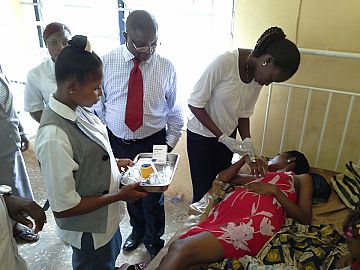Success treating severe malaria in Nigeria
15 June 2016 Copyright Malaria Consortium
Copyright Malaria ConsortiumAbuja, Nigeria – “Mortality rates in those states where we ran our severe malaria project fell from 25 to just one percent. These results are, in part, due to the project and show that the use of injectable artesunate for severe malaria works.”
Dr Kolawole Maxwell, Malaria Consortium Country Director was speaking at an event in Abuja which featured the results of our Improved Severe Malaria Outcomes project across three states: Oyo, Enugu and Cross-River. “The use of Injectable artesunate for severe malaria should be scaled up across all states in Nigeria as stakeholders work toward the achievement of national case management targets,” he added.
Malaria is a serious public health concern in Nigeria, accounting for 30 percent of all childhood deaths and 25 percent of deaths in children under one year of age. Severe malaria is deadly and particularly dangerous for pregnant women and children. It represents the end-stage of untreated or improperly treated malaria, resulting in a near 100 percent mortality rate if left unaddressed.
Until fairly recently, quinine was the drug of choice for such cases. But with the release of the World Health Organization’s revised guidelines in 2010 came a new recommendation that artesunate, a derivative of artemisinin that is injected directly into the vein, replace quinine as the preferred treatment for severe malaria. In support of this policy change, Malaria Consortium’s UNITAID-funded project worked to reduce mortality from severe malaria through the accelerated global adoption of injectable artesunate.
Today, Malaria Consortium is holding an event to share results from the three-year project in Abuja, focusing on sharing results from Nigeria with key stakeholders, policymakers, clinicians, donors, researchers and implementers. It also provides an opportunity to discuss the current practices around the treatment of severe malaria and how these can be improved.
The project, Improving Severe Malaria Outcomes (ISMO), involved supply and demand management of injectable artesunate in six countries – Nigeria, Uganda, Kenya, Malawi, Cameroon and Ethiopia. Malaria Consortium led the project with our partner Medicines for Malaria Venture and in collaboration with the government as well as other partners to support the design, implementation and evaluation of activities in the three states. The project trained 24 master trainers and 440 facility-based mentors in 115 health facilities, as well as supplying 138,000 vials of the treatment.
The result was a sharp drop in the mortality rate due to severe malaria. In addition, the project successfully demonstrated that more effective management of severe malaria with user-friendly injectable artesunate is not only possible, but also accepted by service providers and stakeholders. With sufficient funding, this means that it could be scaled up across all states in Nigeria.
“The Nigerian government is pleased to see such impressive results from this project on severe malaria,” said Dr Godwin Ntadom, who represented National Coordinator of the National Malaria Elimination Programme. “We remain committed to the fight against this deadly disease and the overarching goal of eliminating malaria from our country. Effective management of severe malaria is an essential step to help achieve this.”
Keywords: Facility health services | Health system strengthening | Treatment | Advocacy and policy
Related content
5 June 2013
Improving severe malaria outcomes
15 June 2016Success stories on improving severe malaria outcomes
15 June 2016Improving severe malaria outcomes in Nigeria
Latest news
- Malaria Consortium honoured by Ugandan government for contribution to combat malaria23rd April 2024
- International summit calls for AMR accountability in public health interventions21st March 2024
- Global SMC community celebrates new milestone at SMC Alliance Annual Meeting in Nigeria6th March 2024
- Scaling up key interventions could halve pneumonia-related childhood mortality13th February 2024
- Malaria Consortium and eGov Foundation join Mozambique’s national malaria programme to digitalise seasonal malaria chemoprevention campaigns8th February 2024
- World’s first malaria vaccine rollout launched in Cameroon22nd January 2024